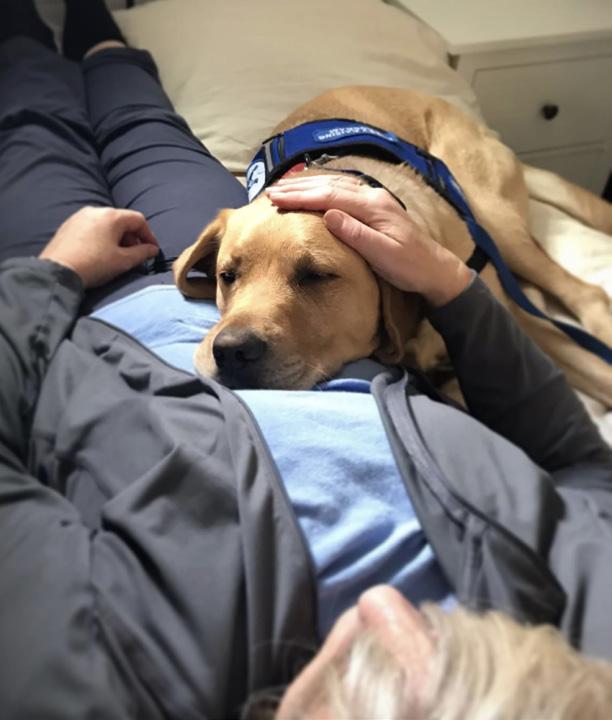
2 minute read
WORK LIKE A DOG
Local Nonprofit Trains Canine Helpers for Lives of Service
BY AUDREY NELSON PHOTOS COURTESY ADNW
Advertisement
It’s easy to miss the turn for the campus of Assistance Dogs Northwest (ADNW). But once you find the driveway, it is unmistakable as a half-dozen smiling dogs trot up to greet you at the gate.
Maureen “Mo” Maurer, the cofounder and executive director of ADNW, almost missed her own turn. Although as a girl she wanted to train dogs to help people with disabilities, she became a CPA instead. It wasn’t until a health scare in her late 30s that she decided to quit her job, enroll at Bergin University of Canine Studies, and—along with her husband, Will—devote herself full-time to assistance dog nonprofits.
The Maurers’ first project was Assistance Dogs of Hawaii, which is still the campus where Maurer spends most of her time. The Washington expansion was more recent. In 2017, the Maurers bought land on Bainbridge, responding to a growing number of requests from the Pacific Northwest. ADNW now places dogs with people in Washington, Oregon and Idaho.
Although ADNW’s grand opening took place just a few months before the COVID-19 pandemic, Maurer has already built a relationship with Bainbridge. ADNW graduates make visits to nursing homes and high schools, and Maurer hosts a workplace readiness program for students with special needs.
This community outreach is in addition to ADNW’s main focus: training service dogs to assist people with mobility limitations, including spinal cord injuries, cerebral palsy and muscular dystrophy. ADNW’s service dogs turn on lights, pull wheelchairs and open drawers and cabinets—simple tasks that restore a huge amount of independence to their humans. Maurer said her favorite part of her job is “just seeing how people’s lives change when they get their dogs.”
When puppies are first admitted to the ADNW training program, they stay at ADNW for a few weeks of kindergarten. Then they’re placed with volunteer puppy raisers, who are responsible for the bulk of the puppies’ basic training. When the dogs return to ADNW, they complete advanced training, and at this point, their future is determined.
Dogs that aren’t cut out for the service track still have hope. ADNW also trains facility dogs, which are placed in agencies, such as hospitals and courthouses, rather than with individuals. Kristin Knight is a licensed clinical social worker at Doernbecher Children’s Hospital in Portland, Oregon. She works alongside Davis, an ADNW graduate.
“Our partnership with ADNW has been such a gift,” Knight wrote in an email interview. “These dogs are so special and really help soften what can be a very frightening and overwhelming experience for our patients and families.”
On the courthouse side of things, Dr. Tambra Donohue directs Monarch Children’s Justice and Advocacy Center in Lacey, Washington. She’s also the primary handler of justice facility dog Coco and the secondary handler of semi-retired courthouse facility dog Astro.

“Probably the best thing we’ve done for our programs and our kids…are these dogs,” Donohue said.
The dogs, a comforting presence in court and during medical exams and forensic interviews, have a radical impact on the traumatized children Donohue works with.

“I have a long career,” she said. “And when I look at all the things that we worked to provide that are very valuable, all the skills, all the talent, all the training—it ends up being that these dogs become the most impactful tool that we have.”
Meanwhile, ADNW trainees who don’t become service or facility dogs might join the 20 percent of Maurer’s charges who need a career change. (Maurer urges you not to call them flunkies.) Or they might make critical scientific discoveries. About six years ago, Maurer published her first medical study, using dogs from ADNW and Assistance Dogs of Hawaii. Following work by Michael McCulloch, a pioneer in bio-detection research and one of Maurer’s mentors, the study found that the dogs could be taught to detect bacterial infections in people. This year, Maurer published another study—the timely “Detection of SARSCOV2 by Canine Olfaction.” She found that dogs could detect COVID-19 infections even before rapid tests could.
Out of all ADNW’s trainees, these bio-detection dogs might seem particularly exceptional. But Maurer doesn’t play favorites. “I think that all dogs have superpowers,” she said.
More at assistancedogsnorthwest.org










